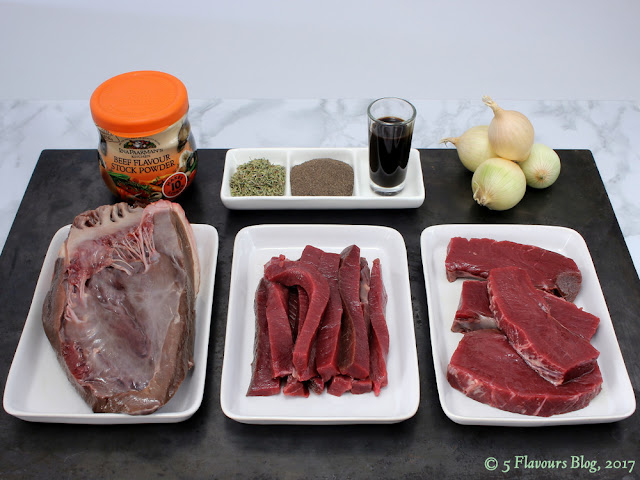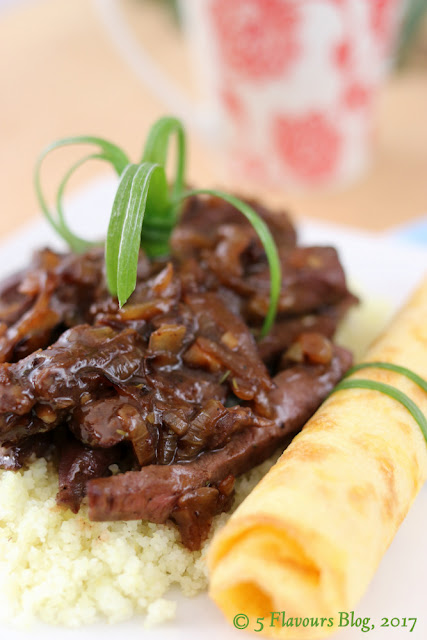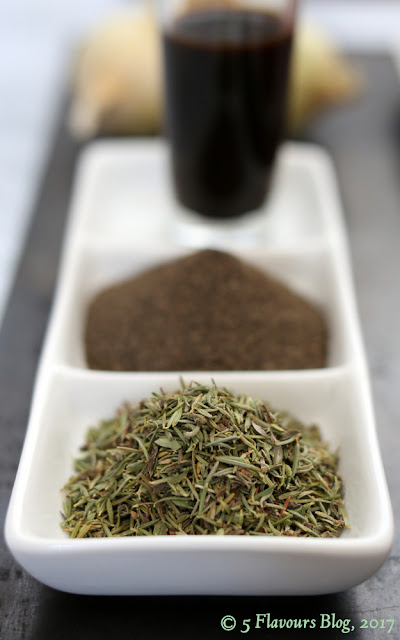Beef Heart in Brown Onion Gravy
Cooking The Dark Side ...
Beef heart is the poor man’s fillet! Tender, tasty, quite flavourful and
easy (fast too) to cook to boot. This is pure heritage food for me. It is one of
my earliest, and fondest, food memories – a somewhat melancholy reminiscence of
times, places and people that will never be again. C’est la vie.
This was one of Dad’s favourite favourites, right up there with curried
mutton tripe, cinnamon sugar pancakes and crispy, well roasted potatoes. Mom
refused to even consider cooking these “horrendous things”, referring to the
offal – she being a city born and raised girl. This task fell to Ouma Plasie,
my paternal granny (plasie being the
Afrikaans diminutive for plaas: a
farm), during her long, but all too infrequent visits to our house. I still
remember her vividly; stately commandeering Mom’s kitchen, dressed in her
trademark Crimplene skirts, flowery blouses and near grey (from being boiled
too many times to remove stains), half length, cotton aprons. And could she
cook and bake? If only I had half the skills and experience of that dear, formidable
woman.
This dish is very simple to prepare and has surprisingly few ingredients
for the eventual depth of flavour and rich, smooth taste. The tricks lay in the
prep-ping of the heart (it needs to be properly cleaned), thoroughly (but
carefully) caramelising the onions and being constantly vigilant during the
cooking process.
The success of the dish rests squarely on the savoury sweetness of
thoroughly caramelised onions. This will require low heat, patience and near
constant attention. The beef heart strips are sautéed in the same pan as, and
after, the onions. This cooking order uses the liquid rendered from the sautéing
meat to lift any caramelised residues from the pan to further boost the flavour
profile. Beef stock powder, Worcester sauce, a tad of black pepper and a
smidgeon of thyme are simple touches to round off and fill out the overall
taste and flavour profiles. The dollop of butter adds a beautiful gloss and satiny-ness
to the gravy. Use the very best stock powder you can lay your hands on.
Beef heart has a delicate, beefy flavour quite unlike rump, porterhouse
or sirloin – although they are all hard working muscles in the living animal.
This recipe is one of those rare occasions where the sharp, easily domineering pungency
of freshly ground black pepper is undesirable. Boring, commercial, fine black
pepper is just the ticket here, not the bull-in-a-china-shop, freshly ground
stuff.
Generally people tend to be squeamish when it comes to cooking and eating
heart. Maybe it’s because Westerners tend to attach a lot of emotional and
symbolic value to this organ. Love, the seat of the emotions, the most
important organ in the body, etc. Many people appear to successfully function
on half a brain (or no brain at all), but on half a heart you're dead in the
water. Every time. Possibly eating heart is a not too subtle reminder of our
own, individual mortalities as well.
Of course the heart's physical appearance doesn't exactly aid in it's
gastronomic popularity either. Massive tubes enter and exit it, surrounded by protective,
hard body cavity fat and, finally, exhibiting visible veins snaking all over it’s
surface. The interior is quite definitely alien looking as well, with all those
valve structures and attendant tendon strings. And the thing never stops
working either, never rests, take a vacation or go anywhere – it just sits
there working all the time. That in itself is definitely quite alien to most humans’
way of life.
But ..., heart is virtually pure protein, making it very nutritious.
There is no interstitial fat or marbling present, making it very healthy as well.
Yet the cooked tissue remains moist (within limits and reason) due to the very
dense nature of heart muscle fibers. And it tastes very good: a touch bland maybe,
but with excellent texture and very fine grain – even more delicate than much vaunted
fillet. Ideal for simple, rustic, yet deeply satisfying recipes that we shall explore
in future posts.
Recipe yields:
2
Portions
|
Preparation time:
±
25 minutes
|
Cooking time:
35
min
|
Difficulty level:
Moderately
easy
|
Special Equipment Required:
1
x Butcher’s knife, shaving sharp
1x
Thin bladed, kitchen utility knife, shaving sharp
1
x Spiral type wire whisk
Ingredients:
Medium onions, thinly
sliced
|
2
|
Sunflower oil
|
45ml
|
Sugar
|
5ml
|
Fresh beef heart, cleaned
& trimmed
|
350g
|
Water
|
± 150ml
|
Beef stock powder
|
10ml
|
Worcester sauce
|
30ml
|
Corn flour
|
7.5ml
|
Salt
|
5ml
|
Fine black pepper
|
0.5ml
|
Dried thyme
|
0.5ml
|
Butter
|
5ml
|
Method:
1. Prep the heart by cutting
it into quarters, from top to bottom, with the butcher’s knife. Remove the venous
and arterial tissue from the top of the heart. The ‘boundary’ between the
tubular and heart muscle tissue is quite clear. Also remove the hard, yellow
fat surrounding (and protecting) these structures and the top of the heart. The
utility knife will be handy in this process. The fat tissue can be removed from
the heart muscle proper in a manner similar to cutting strips of peel away from
an orange or lemon in a top to bottom manner. Rinse well under sold, running
water and pat thoroughly dry. Discard the trimmings.
2. Insert an index finger
underneath the white tendons controlling the interior heart valves. Make
shallow slices into the heart chamber tissue to remove the tendon anchoring
points and then slice away the valve flap tissue – flush against the chamber
wall – on the opposite side. Discard the trimmings.
3. Slice the prepped muscle
tissue into long strips roughly halfway between Stroganoff and Stir Fry in
thickness. Halve the very long strips. Cover and set aside until needed.
4. Sauté the onions and oil
in medium large sauté pan over medium heat until soft and translucent. Add the
sugar, adjust the heat to medium low, and sauté – with frequent stirring and
near constant attention – the onions until well caramelised, 20 – 25 minutes.
Be vigilant not to let the onions char at any point. Transfer the onions to a
clean bowl, cover and keep warm until needed.
5. Return the pan to the
heat and adjust it to medium high. Add the heart strips in one batch and sauté until
the tissue strips stops rendering liquid, 5 – 6 minutes. The strips should
still be pinkish in the centre. Transfer to the onions, cover and keep warm.
6. Combine the stock powder,
Worcester sauce, corn flour, salt, black pepper and thyme in a small bowl. Use
some of the water to mix it into a thin slurry. Add the rest of the water to
the pan over medium low heat. Use the spiral wire whisk to scrape the bottom and sides of
the pan to lift any stuck or caramelized residues. Add the slurry and simmer
until thickened and flavorful. Add the reserved onions and heart strips. Mix
well and warm through. Add a little hot water if the gravy seems to be too
thick.
7. Add the butter, mix well
and serve immediately on crumbly maize porridge (krummelpap), grits, hash browns, stiff polenta or fluffy couscous.
Comments:
- Beef heart is encased in fat and has major arteries and veins entering and exiting the organ. All these structures have to be trimmed away. The subsequent mass loss is quite dramatic: ± 40% is removed. However, it is almost pure protein that remains.
- Heart requires a modicum of experience in working with raw meat and a little bit of knife skills. Very sharp knives are a definite requirement as well. Take your heart to your friendly neighborhood butchery for prepping if you do not feel confident enough take on the task. Alternatively, find a family member, friend or acquaintance that hunts and processes his or her own venison and ask them for help.
- Most large South African abattoirs apparently do not supply local wholesalers, nor retailers, with fresh hearts (or any other organs, except kidneys) anymore. These organs are bulk frozen and packaged as such in 10Kg – 12Kg boxes and supplied to retailers who still carry these items as stock.
- Beef (and lamb) hearts are available from many large retail meat suppliers who still carry the traditional offal ingredients such as lamb’s trotters, reticule stomachs, beef liver, kidneys, pork trotters, etc. the butchery section will – for a fee – thaw and process or clean any organs the buyer are uncomfortable to prep him- or herself.
© RS Young, 2017
– RECIPE INDEX PAGE –
Follow Me on Facebook
Note:
Post
updated on 2024.03.18 to include:
1.
The updated Recipe for downloading as a PDF file, and
2.
Recipe Title and Print Recipe, Recipe Index and Facebook & Pinterest follow
links.






Comments
Post a Comment